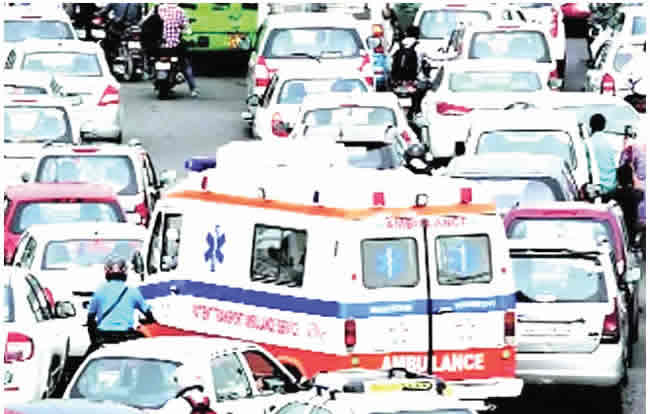
Traffic congestion is a major problem on Lagos roads. According to officials of the Lagos State Government, over 1.6 million vehicles ply Lagos roads daily. Traffic congestion, according to ambulance drivers, should, however, not be seen as only a source of frustration for commuters, but as a public health concern requiring prompt attention. The drivers noted that it is causing avoidable deaths of residents during emergencies and blamed the problem on the poor attitude of many motorists. ANGELA ONWUZOO reports:
Daily traffic stress has become an acceptable experience for many Lagos residents with many people now used to getting stuck in traffic for hours while commuting within the city.
Ambulance drivers in Lagos are, however, lamenting the impact of the daily traffic congestion on emergency response.
The drivers said many emergency patients are being sent to their early graves while relevant authorities watch helplessly.
Sharing their experiences with PUNCH HealthWise, the ambulance drivers while calling for proactive actions to help enhance the operation of ambulance services, lamented that Lagos gridlock is costing lives. They said that ambulances sometimes with patients in them are often stuck in traffic for hours at times they are racing to reach the hospitals.
Some of the ambulance drivers who spoke with our correspondent lamented that Lagos has no dedicated lanes for emergency vehicles yet most Lagos drivers are often unwilling to make way for them to get to the hospital on time – a situation they say is leading to avoidable deaths of critically ill patients requiring emergency care.
According to them, sometimes the patients die en route to the hospital or shortly after arriving at the hospital.
They lamented that they feel frustrated having to hear a doctor say ‘dead on arrival or brought in dead’ after getting a patient to the hospital late as a result of a traffic jam.
In 2021, Lagos State with a population of over 22 million people was ranked the second most stressful city in the world according to a study conducted by Vaay, a German firm.
PUNCH Healthwise findings revealed that not only does traffic congestion lead to the death of emergency patients, but it also frustrates emergency response as some of the ambulance drivers claimed that they are often arrested by the officials of the Lagos State Traffic Management Authority, whenever they follow the Bus Rapid Transit lanes as they race against the clock to reach the hospital.
Sharing his experience with our correspondent, one of the ambulance drivers, Mr. Moses Akinbobola, said some emergency patients have died inside his ambulance in traffic as many motorists do not understand they should move out of the way for an ambulance rushing a patient to the hospital.
Akinbobola who is a private ambulance operator said, “Last year, I was urgently called to come and pick up a male patient who was in a critical condition at a private hospital in Agege and take him to the Lagos State University Teaching Hospital, Ikeja.
“The patient was on a drip inside the ambulance when we left for LASUTH. But on the way, there was heavy traffic. I used my lights and siren to get people to give way, all to no avail.
“We ended up spending over two hours for a journey that would have taken less than 40 minutes because the roads were blocked.
“When we got to LASUTH, a female doctor came out to attend to him, after a few minutes of examinations, she pronounced him dead and said there was nothing she could do.
“The two relatives of the man that followed us to the hospital wept uncontrollably and said if not for the traffic, their brother could have gotten to the hospital on time and his life could have been saved because the man’s breathing changed while we were approaching the LASUTH gate.
The ambulance driver also narrated a similar experience of how he lost a patient in traffic when he was called to pick up the patient from Gbagada General Hospital and rush him to LASUTH.
He said, “Getting to LASUTH, they gave him some treatments and asked us to go to Ikorodu General Hospital. On the way to Ikorodu General Hospital, there was heavy traffic and by the time we got to Mile 12, the man has passed away inside my ambulance.”
LASTMA officials arrest us for using BRT lanes
“There is also the case of a surgical patient that I went to pick from a private hospital in Ibadan, Oyo State to Gbagada General Hospital, Lagos who died in similar circumstances on getting to Lagos.
“So, there are many cases and when you try to use the BRT lane, the officials of the Lagos State Traffic Management Authority will arrest you.”
Continuing, he said, “I have been driving an ambulance for over seven years now and I can tell you that traffic jams are a silent killer because many patients requiring emergency care often die on their way to the hospital before help could come their way.
“The government should look into it and raise awareness for people to know that they have to give way whenever they see an ambulance blaring siren because there is an emergency.”
Mr. Taiwo Akintayo is another ambulance driver in the nation’s largest commercial city who has a sad story to tell about conveying patients requiring urgent care to the hospital during traffic congestion on Lagos roads.
The Ogun State indigene narrated, “No matter how you blare a siren, many Lagos motorists will not give way for you to pass when you are rushing a patient to the hospital when there is traffic.
“I have witnessed four incidents in traffic where patients died inside my ambulance while on their way to the hospital and when you try to use the BRT lane, LASTMA officials will not allow you. And if you try it, they will arrest you.
In one of the incidents, I was called to come and pick up a patient from a private hospital at Sabo Yaba and take the patient to LASUTH in the morning. That very day, there was serious traffic on Ikorodu road.
“Getting to Palmgrove, there was no road at all, everywhere was blocked. By the time we got to Maryland, the patient died. The other three also died in a similar circumstance.
Copyright PUNCH.
All rights reserved. This material, and other digital content on this website, may not be reproduced, published, broadcast, rewritten or redistributed in whole or in part without prior express written permission from PUNCH.
Contact: [email protected]





